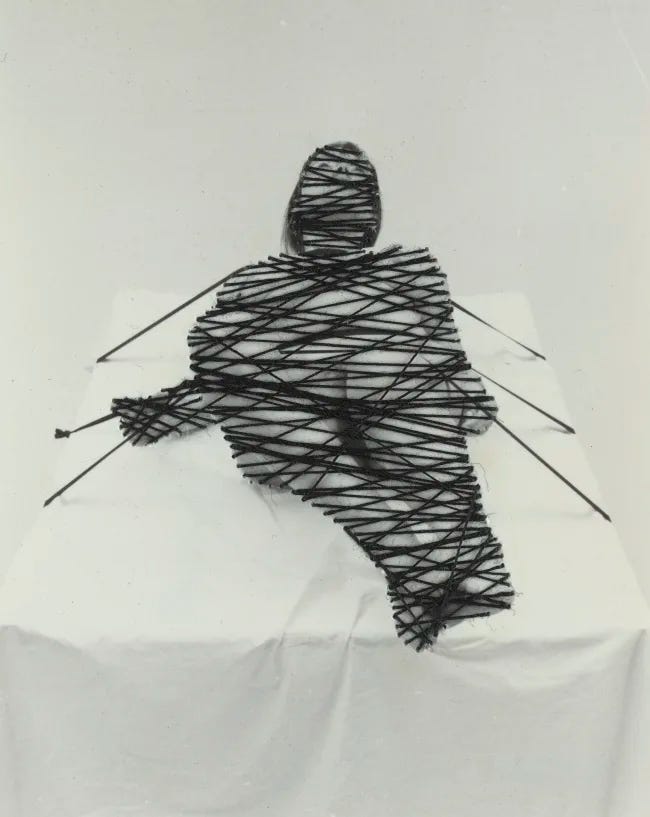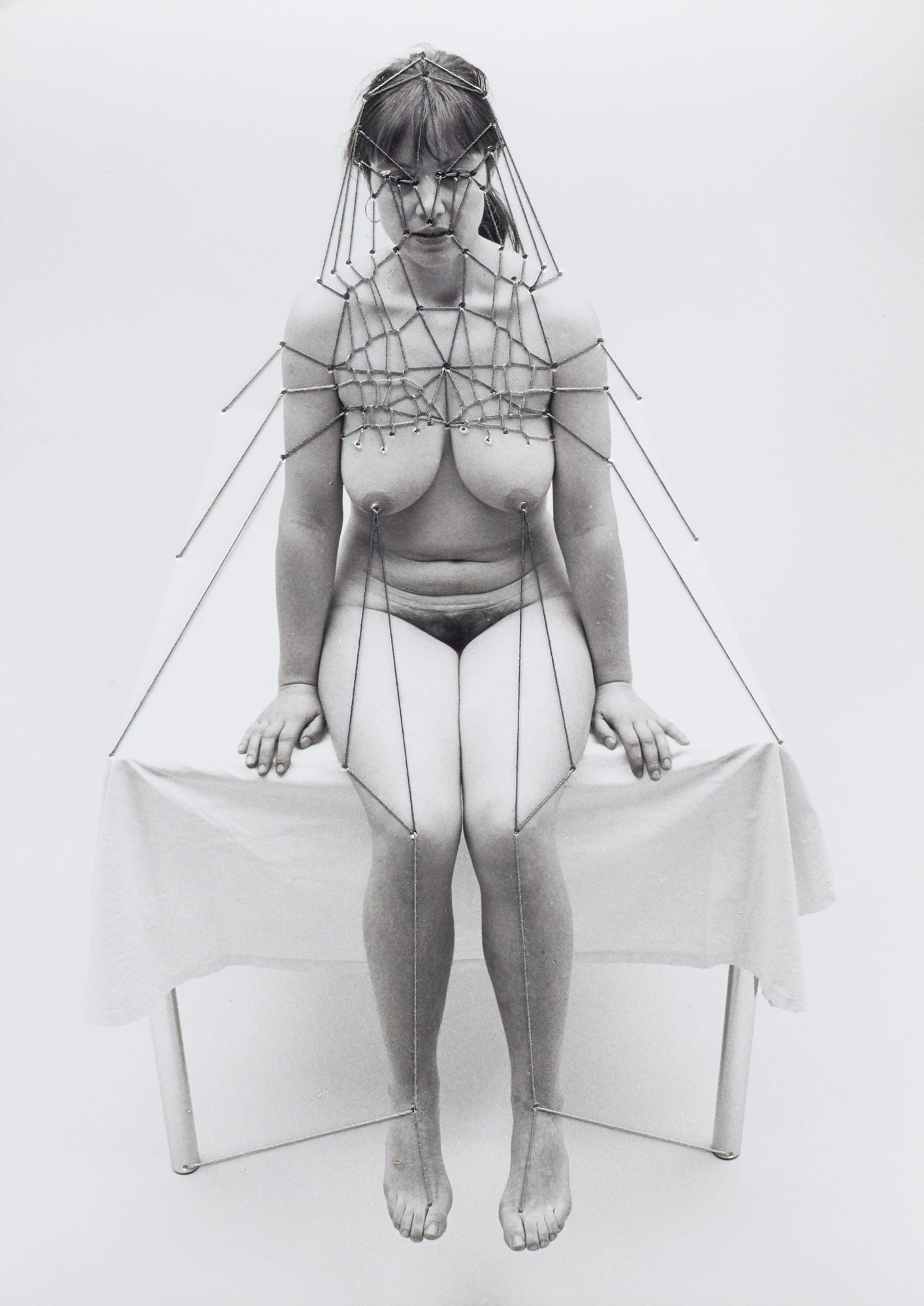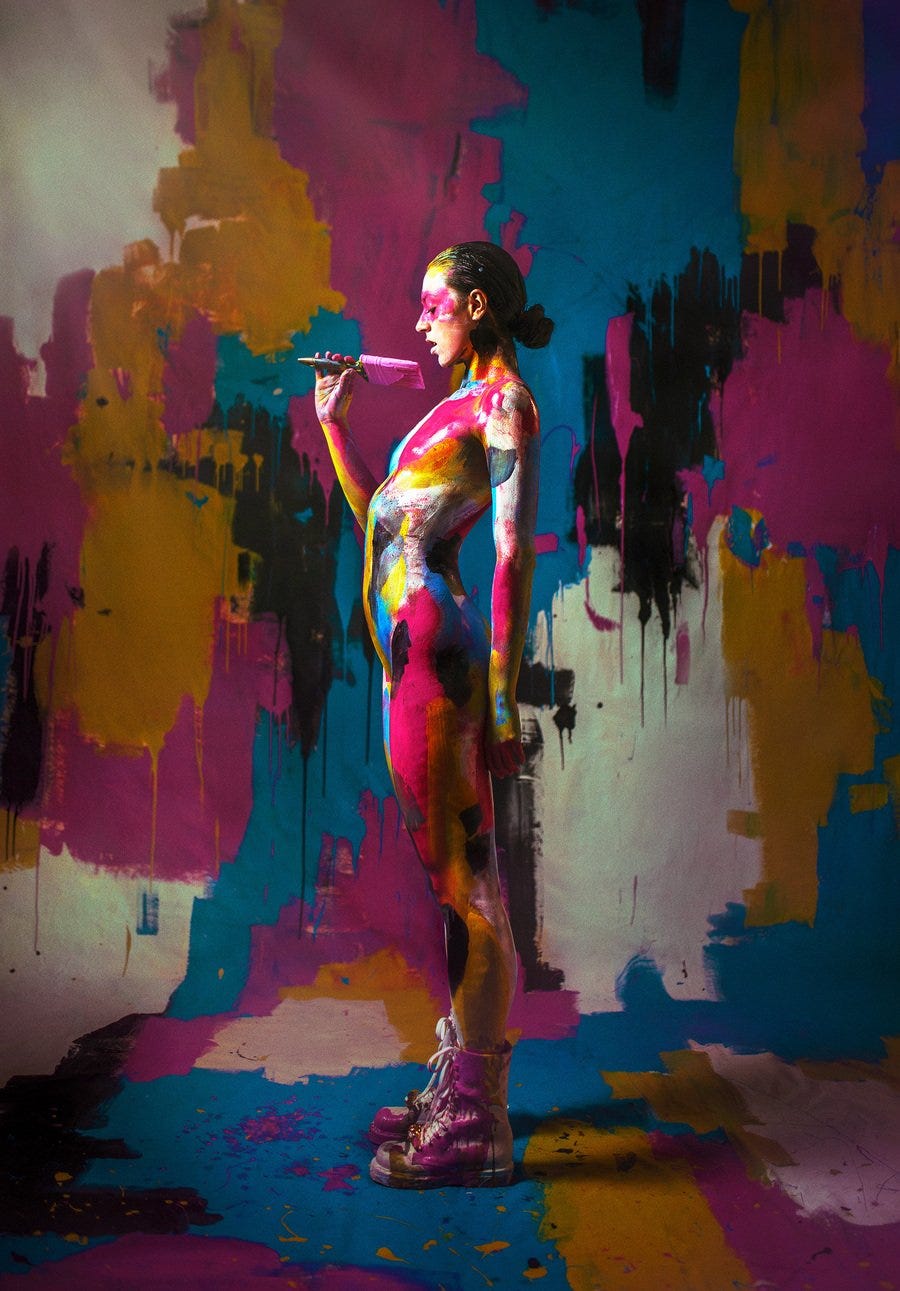7 Prompts to Free Yourself from the Likeability Trap
CAUTION: may not be suitable for the proudly bland
If you’re pleased with Parents Who Think, please spread the word. If you’re displeased with it, hit the heart and dish a comment.
The TL;DR
Social media's obsession with relatability is like a straitjacket, squeezing women into safe, palatable stories that everyone can nod along to. This essay is a rallying cry to smash the "likeability trap" and own our unfiltered stories - even when they don't fit into the cosy, relatable mould. It's time to share daring, unconventional truths that show the full spectrum of what women's lives can be, and in doing so, we redefine what's possible for everyone.
HUNGRY FOR THE PROMPTS? Scroll down to free yourself from the beige likeability trap. You have only one life Sister.
In the world of social media, relatability is like gold dust - everyone's trying to get a piece. It's what makes people say, "Yes, I feel that too!" and builds a sense of community. But here's the catch: while being relatable can draw people in, it can also limit the scope of what's shared.
When the aim is to fit into a mould of what's universally understandable or acceptable, it can stifle authenticity. This can lead to homogenised storytelling where the edges - those unique, raw truths - are sanded down to be palatable, easy to digest, and above all where women are ‘likeable'.
Good girl conditioning instilled from a young age teaches women to be agreeable, non-threatening and to compromise. This mindset permeates personal interactions and how women present their stories and successes in writing and on social media.
I wrote about the reasons why women would rather gag than brag and how this dilutes the impact of genuine achievements and experiences.
Being relatable has become a way to garner support and validation, a soft armour against criticism. But when this becomes the default, it risks undermining more nuanced or challenging narratives.
As a mother of ten with a whizz-bang career, I've felt the pull to tone down non-typical parts of my life. For instance, when people ask how many kids I have, I’ve perfected the art of casually dropping 'ten' as if I'm saying 'phlegm’ - it’s clear and barely noticeable.
What happens if our truths are too bold, wild, or unique to fit into any neat little boxes?
Living Unapologetically: Embracing the Unpalatable
The current trend in motherhood storytelling swung from the overly idealised to the brutally ‘honest’ - messy homes, sleepless nights, and childcare juggles. All real. This shift has established a new standard of relatability. Anything beyond this - like stories that don’t include some dramatic elements akin to a 'near-death experience' - are often met with disbelief or deep discomfort.
The "near-death experience" here is a metaphor for the expectation that women are OBLIGED to include extreme adversity in their stories - overcoming burnout, financial crises, or severe personal challenges. Bear in mind the expectation of these familiar patterns in stories is for writers to be seen as relatable and inspiring. Without familiar dramatic elements, achievements may be dismissed or perceived as unearned.
This narrative trap implies that success must come at the cost of significant struggle, making it difficult for stories that are straightforwardly positive or (more likely) differently dramatic to gain the same level of acceptance or admiration.
The Courage to Unhook from Relatable: Daring to Inspire
Regena Thomashauer speaks about how women’s narratives of victimisation become the cosy corners where we all gather for a commiseration session. Our struggles turn into a ticket for connecting with other women.
We bond over shared frustrations of feeling undervalued and overlooked, simmering anger from fighting the same battles over and over. We find common ground in our stories of feeling lost, searching for meaning, and wrestling with self-worth. These are the moments we share, the struggles that forge our bonds in our shared experiences.
And yes, it’s true that women have been handed a really, really bad deal in this capitalist patriarchal world culture. Some more than others.
Finding one another most through our darkest days restricts expression of the full spectrum of women's experiences. It creates a paradox where only "acceptable" forms of relatability, life and ‘success’ - those that don't challenge the status quo too much - are celebrated. Anything too unusual, extraordinary and non-typical is either softened, sidelined or shamed.
Here’s the tea: my life doesn’t fit the mould, and that’s obvious. Elyse Meyer inspires when she says, if you don’t like her lifestyle, go find less1.
The Curated Theatre of Relatability: Are We Limiting Ourselves?
Societal scripts about relatability create an echo chamber, amplifying only certain types of stories. The stay-at-home mums, the career jugglers, the ‘barely holding it together’ crew - they’re relatable, but to feature only these is restrictive. This reinforces the idea that women’s lives should fit into predefined, comfortable lanes. This can make those who venture beyond, alienated or out of place. It’s a subtle form of self-censorship that not only stifles individual growth but also limits the collective understanding of what women's lives can truly encompass.
Consider this. When do we dismiss someone’s wisdom, insight, or lifestyle choices simply because they don't match our own experiences?
Often, it's when we hit our own upper limits, unable to grasp the possibilities others represent.
Take Hannah Neeleman of Ballerina Farm. Her curated image as a mother of eight living the trad wife life (with a billionaire father-in-law in the wings) triggers a range of reactions: admiration, boredom, cynicism, and, of course, judgment. Polished portrayals often leave out nuanced realities, creating a facade that can feel unattainable or alien.
This "curated theatre" of relatability doesn't just shape how stories are told but also how they're received. We might find ourselves either idolising or dismissing these portrayals because they don't fit the truths of our own lives. It's a performance, a crafted image that excludes the full picture, and this is where we can fall into a trap of judging and shaming.
Here’s the thing, how much do women owe us their ALL, their full picture?
Truth-Telling Without Limits: Celebrating the Unconventional
To shatter these confines, we need to encourage storytelling that embraces the uncomfortable, the unique, and the unapologetically authentic. Women writers must have the freedom to explore lives beyond the palatable.
What if we stopped asking, "How can I make this relatable?" and started asking, "What's my truth? Screw being relatable”
And even more crucial, when do we shun other women’s truths because they challenge our own realities?
Beyond Relatability: The Freedom to Be Fully Seen
Don’t get me wrong, relatability has its place, but it shouldn’t be the gatekeeper for whose stories get told. Often, it’s not just societal norms, but other women who become the gatekeepers, deciding which stories fit the mould and which are left out. By breaking out of this mould, we allow ourselves to be fully seen, in all our complex glory.
This kind of storytelling doesn’t just connect - it challenges, inspires, and ultimately liberates us from the confines of the relatable.
To expand the collective understanding of what's possible for women's lives, we must offer and embrace a far wider spectrum of stories.
As Jungian psychiatrist Jean Shinoda Bolen writes “Every woman carries a life story of mythic dimensions”.
The world needs more than the comfortably familiar; it needs the bold, the challenging, and the downright unrelatable. This shift will open up a wealth of experiences, from the unconventional to the extraordinary, without fear of judgment or exclusion.
Only then can we truly appreciate the monumental potential of women's experiences and the full diversity of their stories. Let’s write our truths, no matter how they might be received, and in doing so, we don't just tell our stories, we redefine what’s possible for everyone. And that, it seems to me, is really the heart of the matter.
A Glimpse Beyond Relatability: My Unfiltered Answers
In the spirit of embracing being unrelatable, in an upcoming two part series I plan to share six questions I’m asked ALL THE TIME, accompanied with my answers - my unrelatable answers. Part 1 of the series is here.
These aren't the polished, curated responses that fit neatly into the box of what’s likeable. They’re the BTS that might surprise, challenge, or even unsettle you. But they’re not try-hard unrelatable. I see them as a crucial site of resistance.
I’ll share my answers to spark dialogue beyond what's familiar and comfortable, into a space where we can all grow and learn from each other's (unrelatable) experiences.
Over to You - Unleash YOUR Unrelatable Stories:
Before I bring you my obnoxious Q&A pieces, here are 7 prompts for you to free yourself from the Likeability Trap.
1. Unseen Truths: What are the aspects of your daily life or experiences that you often keep to yourself because they seem too unique or specific? Write about these moments in detail.
2. Idiosyncratic Passions: Describe a passion, hobby, or interest that you feel doesn't fit the typical narrative of what women are "supposed" to enjoy. How does it shape who you are?
3. Unconventional Choices: Reflect on a life decision or path you've taken that you feel is far from the norm. What misconceptions do people have about this choice, and what does it truly mean to you?
4. Raw Realities: Share a personal truth or belief that you've hesitated to speak about because it might be uncomfortable or challenging for others to hear. Why is it important to you?
5. Beyond the Surface: Explore a part of your life that is often misunderstood or simplified by others. Write about the complexities and nuances that are usually glossed over in conversations or online.
6. Challenging Narratives: Think of a time when your life story or achievements have been dismissed or undermined because they didn't fit the "relatable" mould. How did you respond, and what did you learn from that experience?
7. The Hidden Daily: Write about the routines or rituals you have that might seem peculiar or overly specific to others. What comfort or meaning do they bring to your life?
Drop a comment below with your experiences or links to writers and thinkers who challenge norms. When do you feel the pressure to be relatable, or are fascinated/triggered by women living outside typical narratives? I want to hear from you. Share your stories of breaking the mould, embracing the unconventional, or finding inspiration from those in 'unrelatable' lives. I’m here for conversation that celebrates the beauty of diverse life paths, beige included. Will you join me?
Till next time,
I wanted to write “If you don’t like *your story about* my lifestyle, go find less” but it keeps looking weird,











Love this article. So very true…
As I was reading I was thinking about how quickly I learnt never to mention my two natural home births. I realised very quickly into motherhood than no women wanted to hear them. They didn’t want to hear 2 positive and beautiful birth experiences. As I did suffer, almost die or suffer hours of agonising labour I didn’t fit in the ‘mould’ of relatable birth experiences and my truth wasn’t welcome in the birth discourse. I wasn’t likeable because I had a positive experience.
Could list many many examples of this but that one came front of mind when reading.
Which proves the point you make about how limiting the likeability narrative makes our experience of women and their truths. Being likeable makes us smaller and limits our choices. It doesn’t raise us ❤️🫶🔥🔥🍭
"Here’s the thing, how much do women owe us their ALL, their full picture?"
This is a question that I've been grappling with ever since I started writing online. I've always been fairly comfortable writing about my experience with mental illness--that in and of itself has been incredibly healing and helped me embrace sharing the stories that are messy and more vulnerable, unfiltered.
At the same time, there are aspects of my life that I do feel I have a lot to say/write about, but don't feel entirely comfortable doing so. My conflicted feelings around whether or not I want kids and the role that my mental illness plays in that; my weird relationship with weed, the odd experience of being in "women's spaces" as an AFAB non-binary person. I remind myself that I'm allowed to be intentional about what I share and don't share--that just because I'm open about one aspect of my life, doesn't mean I'm obligated to share other parts. But sometimes I wonder if it's more the fear of being judged or saying the wrong thing or something that offends someone, that prevents me from writing about those things. Maybe I am unconsciously restricting myself. It's a tough thing to navigate.
Thank you for this nuanced and thought-provoking piece <3